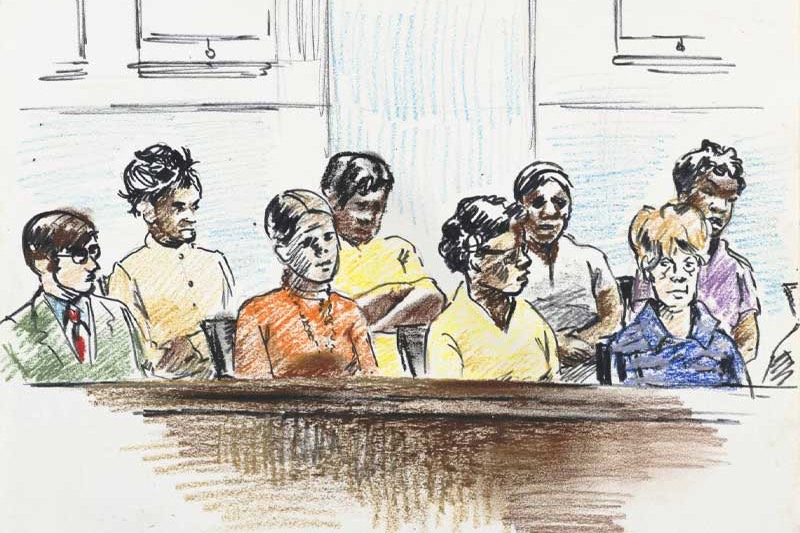CMHS in the News
CBS Story - Supporting Jurors After Traumatic Trials
New York Times Article - After a Grisly Trial, Jurors Are Left With Mental Scars and
Few Resources
The Philadelphia Citizen - HEALING THE VICARIOUS TRAUMA OF JURY DUTY
Post-Trial SUPPORT FOR JURORS
A Collaboration between West Chester University's Community Mental Health Services, The Common Pleas Court of Philadelphia and Participating Counties in Pennsylvania
This webpage was developed to provide you with important information and resources now that you have completed Jury Duty.
Jury Duty Facts
- Nearly 450,000 citizens are called to duty in Philadelphia each year.
- Each year In the U.S., more than 1.5 million citizens take a solemn oath to perform their vital civic responsibility as jurors.

West Chester University-Community Mental Health Services (WCU-CMHS) offers a program to support jurors:
Post-Trial Support for Jurors
About the Program
The Post-Trial Support for Jurors Program offers free support services for individuals who have completed jury duty or have completed voir dire (jury selection process). Services are available for individuals who served on criminal cases and on civil cases.
The program includes three (3) free 30-minute phone meetings with a doctoral student clinician or licensed psychologist trained in providing psychological first aid. These calls are designed to help jurors process the jury duty experience and to access emotional resources and healthy coping during a challenging time.
You may use as many of these 3 free sessions as you feel necessary. Some individuals may feel the need to continue speaking with a clinician about their experience. In these cases, we can provide names of therapists you can contact to begin therapy.
Post-Trial Support for Jurors is a confidential service. The discussion during phone meetings will not be shared with outside entities1
Post-Trial Support for Jurors Form
If you would like to take advantage of the Post-Trial Support for Jurors program, please fill out the online form below. After your jury duty service has been verified, one of our staff will contact you within 48 business hours to schedule your first phone call. Please note that our office is closed on Fridays.
If you have any questions about this service, you may contact us at 610-436-2510 or email: cmhs@wcupa.edu
If you are interested in learning about the psychotherapy or psychological assessment services offered here at CMHS, please check out our website: WCU Community Mental Health Services Website
1Confidentiality Exception: Cases in which an individual discloses the potential for harm to self or others may require disclosure. Reports of possible child or elder abuse must, by law, be disclosed.

Why Support Jurors Post-Trial?
Supporting jurors after jury duty is important because it acknowledges the significant civic responsibility they undertake, often involving stressful situations and disruptions to their daily lives, and helps them process their experience while ensuring they feel valued and respected for their contribution to the justice system; this can include providing emotional support, addressing potential stress from particularly difficult cases, and simply expressing appreciation for their time and service.
Key Reasons for Courts to Support Jurors, Post-Trial:
Psychological impact:
Serving on a jury, especially in high-profile or emotionally charged cases, can lead to stress and anxiety for some jurors.
Civic duty:
Jury service is considered a vital civic duty, and providing support shows appreciation for individuals who dedicate their time to the legal system.
Maintaining public trust in the justice system:
When jurors feel valued and cared for, it strengthens their belief in the fairness and integrity of the legal process.
Addressing potential concerns:
Jurors may have questions or concerns about the case after leaving the courtroom, and support mechanisms can help address these issues.
How to Support Jurors Post-Trial:
Access to mental health resources:
Providing contact information for employee assistance programs (EAPs) or mental health professionals can help jurors access support if required.
Open communication:
Judges and court staff can openly acknowledge the challenges of jury duty and express gratitude for jurors' service.
Flexible scheduling:
Employers can consider accommodating jurors' schedules upon their return to work to minimize disruption.
Self Care and Stress Management Post-Trial
A great way to decompress from the responsibility of completing jury duty is by trying tried and true ways to reduce stress in your body. While low levels of stress can lead to us being more productive, extreme or chronic “stress” is actually our body’s nervous system preparing for danger. In some situations, this reaction is appropriate and important for survival. There are other times when a stress reaction happens in situations that are not dangerous. Long term or chronic stress can affect our emotional health in the form of panic attacks, depression, increased use of alcohol or drugs. Stress is well known to affect our physical health as well including increased blood pressure, gastrointestinal distress, and, at worst, cardiac problems. For all of these reasons, managing stress before it gets to a critical point is important.
The resources below offer various ways to chill out and help your body return to a calm and rested state.
Learn about your Perceived Stress Scale
Cornell University Stress Management Strategies
